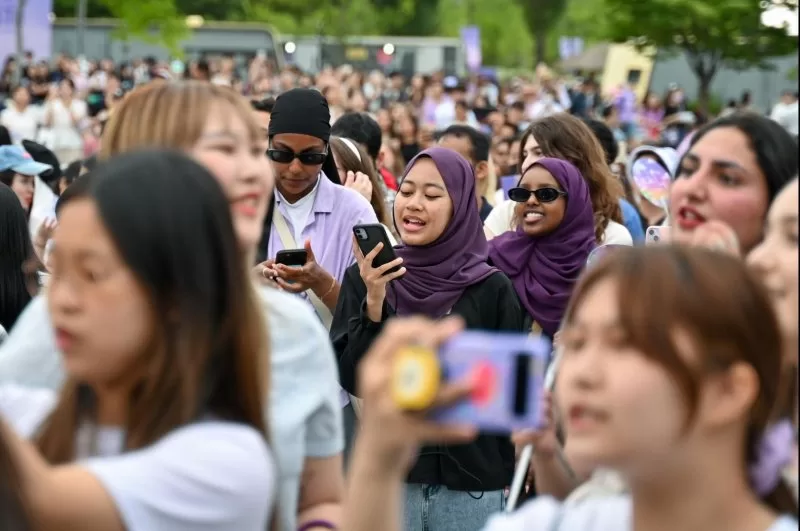South Korea will introduce a new K-culture visa for foreign trainees in the entertainment industry, Seoul’s Finance Ministry announced Monday. The “Korean Wave” of cultural exports such as K-pop and K-dramas has driven overseas tourism to South Korea, as seen at a BTS fan event in 2023. File Photo by Thomas Maresca/UPI
SEOUL, June 17 (UPI) — South Korea will introduce a new K-culture visa for foreigners to receive entertainment industry training as part of a comprehensive plan to boost inbound tourism unveiled Monday.
The visa will be launched on a trial basis this year, the South Korean Finance Ministry announced, in an effort to leverage the overwhelming global popularity of Hallyu, or the “Korean Wave” of cultural exports. It will allow foreigners to stay in the country for extended periods while studying at training academies in fields such as K-pop, choreography and modeling.
Tourist arrivals to South Korea have been skewing younger in recent years and K-content is cited as the top attraction for those in their 20s and 30s, according to the ministry.
The government is also considering expanding a digital nomad visa for foreigners to live in Korea while working remotely.
A one-year pilot of the digital nomad visa began in January, and officials are looking at adding region-specific offerings to give foreigners more incentives and options to stay in the country.
The moves are part of an overall plan to lift the tourism sector as it continues to rebound from the impact of the COVID-19 pandemic.
The number of foreign arrivals in South Korea swelled from a pandemic low of 970,000 in 2021 to 11 million in 2023, the ministry said. In 2019, some 17.5 million people visited South Korea.
While arrivals are climbing, tourism revenue has been slower to recover. Through April of this year, visitor numbers reached 90% of the level before the pandemic — but spending was only at 70%.
A move away from group tours to individual travel and an increased emphasis on cultural experiences rather than shopping are the primary reasons, according to officials.
The average length of stay has also decreased, from 7.8 days last year to 6.5 days this year. Specialized visas for K-culture trainees and digital nomads will stimulate longer-term stays, the government hopes, as it has set a target of 30 million tourists visiting Korea and $30 billion in tourism revenue by 2027.
Other measures announced Monday aim to reduce visa issuance times and streamline entry procedures for foreign visitors.
Short-term public transit passes, expanded foreign language content on domestic apps and new flight routes with countries such as Indonesia and Mongolia will also be introduced.
